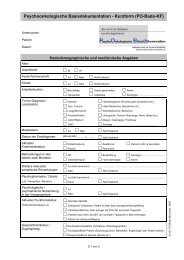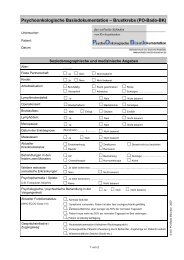PO-Bado Manual (2 - PO-Bado - TUM
PO-Bado Manual (2 - PO-Bado - TUM
PO-Bado Manual (2 - PO-Bado - TUM
Create successful ePaper yourself
Turn your PDF publications into a flip-book with our unique Google optimized e-Paper software.
<strong>PO</strong>-<strong>Bado</strong> <strong>Manual</strong> (© work group <strong>PO</strong>-<strong>Bado</strong> 2004) 12<br />
Example: Earlier moral concepts and certitudes are being questioned. The patient has<br />
had “the rug pulled out from under his/her feet”. (Rating: 3)<br />
Example: A patient feels hopeful at times and has confidence in the treatment. But<br />
these periods alternate nearly every day with phases of fear and resignation. He feels<br />
uneasy because he does not recognize himself in this predicament. (Rating: 2)<br />
Strong feelings of insecurity can indicate a shock reaction, which cause the patient to feel<br />
confused, paralyzed, overwhelmed, frozen or unable to act. Affective blockades (emotional<br />
laming, withdrawal) or affective overload are possible outcomes. If the shock reaction induces<br />
an affective blockade, the patient seems quiet and composed and perceives the environment<br />
as rather unreal. Often information does not get through to the patient.<br />
• Cognitive impairments (e.g. problems with concentration and memory)<br />
Are cognitive abilities like concentration, memory, spatial or temporal orientation affected?<br />
Does the patient suffer from e.g. not being able to remember things?<br />
Example: A patient describes no longer being able to concentrate. He finds it difficult to<br />
read the newspaper, which he usually likes to do. He is not able to grasp the<br />
sentences he reads and can not remember what he has read. He expresses the fear of<br />
“going mad”. (Rating 4)<br />
Example: A patient misses two consecutive important doctor’s appointments she had<br />
forgotten to note in her diary. She reports that “embarrassing” things like that have<br />
been happening more often lately and that her memory is “failing”. (Rating 2)<br />
• Helplessness / vulnerability<br />
Does the patient suffer from feeling helpless or at the mercy of the illness and/or caregivers?<br />
Is the situation perceived as a loss of control? Does he/she express feelings of powerlessness<br />
or suffer from not being able to influence the situation? Is it a problem for the patient that<br />
he/she no longer has important things in check and has to be dependant on others?<br />
Helplessness can also be manifested in nonverbal behaviour, for example when patients<br />
seem disoriented, overtaxed or lost.<br />
Example: A bedridden patient complains that she does not know where important<br />
things are because everyone who comes into her apartment (mobile nurses, daughter,<br />
aunt) cleans up and “rummages around” without asking for permission or informing her<br />
about it. (Rating: 2)<br />
Example: A patient insists that he is well informed about his illness and the upcoming<br />
chemotherapy. He feels he has been consulted about important decisions in his<br />
therapy and has confidence in the physicians. (Rating: 0)








